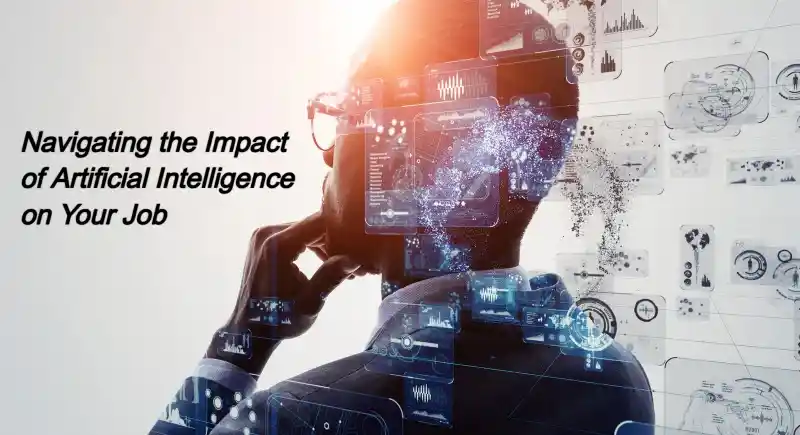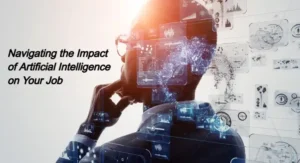Artificial Intelligence (AI) has emerged as a transformative force in the modern workplace, revolutionizing industries, reshaping job roles, and redefining the skills required for success. While AI promises to enhance productivity, efficiency, and innovation, its adoption also raises concerns about job displacement, automation, and the future of work.
In this article, we delve into the impact of AI on various aspects of employment, explore the challenges it poses, and highlight the opportunities it presents for workers in the digital age.
Automation and Job Displacement:
One of the most immediate impacts of AI on the workforce is automation, where AI-powered technologies and algorithms replace human labor in routine, repetitive tasks. Industries such as manufacturing, transportation, and customer service are already witnessing significant automation, leading to job displacement for workers performing manual or low-skilled tasks.
While automation offers benefits such as increased efficiency, cost savings, and error reduction, it also raises concerns about job loss and unemployment. Workers in industries susceptible to automation must adapt by acquiring new skills, upskilling, or transitioning to roles that require human creativity, critical thinking, and emotional intelligence—areas where AI still lags behind human capabilities.
Augmentation and Collaboration:
Contrary to the notion of AI replacing human workers entirely, many experts believe that AI will augment human capabilities and enhance collaboration between humans and machines. AI-powered tools and platforms can assist workers in performing tasks more efficiently, analyzing data, and making informed decisions, ultimately enabling them to focus on higher-value activities that require human judgment and intuition.
For example, in healthcare, AI can assist doctors in diagnosing diseases, analyzing medical images, and developing personalized treatment plans, leading to improved patient outcomes and enhanced productivity. Similarly, in finance, AI algorithms can analyze market trends, identify investment opportunities, and optimize trading strategies, empowering financial professionals to make better-informed decisions.
Skills Gap and Lifelong Learning:
As AI continues to advance, there is growing concern about the widening skills gap between the capabilities of AI systems and the skills possessed by the workforce. Many jobs are evolving, requiring workers to adapt and acquire new skills to remain relevant in the digital economy. Skills such as data analysis, programming, machine learning, and digital literacy are becoming increasingly essential across industries.
To address the skills gap, individuals must embrace lifelong learning and invest in continuous skill development and education. Online courses, workshops, and certification programs offer flexible and accessible opportunities for workers to upskill or reskill in high-demand areas. Employers, educational institutions, and policymakers must collaborate to provide training and support for workers navigating the changing job landscape.
Job Creation and Innovation:
While AI has the potential to automate certain tasks and roles, it also creates new opportunities for job creation and innovation in emerging fields. Industries such as cybersecurity, artificial intelligence, data science, and renewable energy are experiencing rapid growth, generating demand for skilled workers in areas such as cybersecurity analysts, AI engineers, data scientists, and renewable energy technicians.
Moreover, AI enables businesses to innovate and develop new products, services, and business models that address evolving consumer needs and market trends. Startups and entrepreneurs are leveraging AI to disrupt traditional industries, create new markets, and drive economic growth. By fostering innovation and entrepreneurship, AI has the potential to create new job opportunities and drive economic prosperity.
Ethical and Societal Implications:
As AI becomes increasingly integrated into various aspects of society, there are ethical and societal implications that must be addressed. Concerns about data privacy, algorithmic bias, job displacement, and the concentration of power in the hands of AI developers and tech giants require careful consideration and regulation.
Workers, employers, policymakers, and technologists must collaborate to ensure that AI is developed and deployed responsibly, ethically, and inclusively. This includes establishing guidelines for AI development, promoting diversity and inclusion in AI research and development, and ensuring transparency and accountability in AI systems.
In conclusion, the impact of AI on the workforce is multifaceted, presenting both challenges and opportunities for workers in the digital age. While automation may lead to job displacement in certain industries, AI also augments human capabilities, fosters innovation, and creates new job opportunities in emerging fields.
To navigate the impact of AI on their jobs, workers must embrace lifelong learning, adapt to changing skill requirements, and cultivate a growth mindset. Employers must invest in workforce training and development, promote diversity and inclusion, and prioritize ethical AI practices. By harnessing the potential of AI responsibly and collaboratively, we can create a future where humans and machines coexist harmoniously, driving economic prosperity and societal advancement.





























